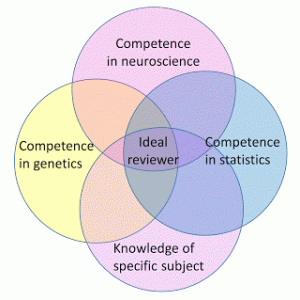by David Troy @DavidTroy79 and Jim Lumsden @jl9937
Human beings are social creatures; we evolved to work together. Our education system is built around this fact; and throughout school and university we encourage students to team up to solve problems, discuss concepts and answer questions. At the same time, as science advances into the 21st century, we find ourselves trying to answer increasingly difficult questions. These new problems cannot be effectively addressed by one person working alone, and academia and industry are increasingly embracing ‘Team Science’, with many articles  being authored by large groups of individuals with a range of specialisms. As experts in disparate fields, these scientists combine their strengths to triangulate evidence and build robust theories. However, in our experience, the field of experimental psychology has yet to adapt to this model of working, and we suspect this has its root at the very beginning of a psychologist’s career: the solo nature of the psychology PhD. This final stage of training to be a scientist consists of a 3-4 year long solo project which, by its very nature, does not foster close collaboration between researchers. A PhD is a course in independent working – it might teach determination, motivation and self-confidence, but it does not teach teamwork. We believe this needs to change.
being authored by large groups of individuals with a range of specialisms. As experts in disparate fields, these scientists combine their strengths to triangulate evidence and build robust theories. However, in our experience, the field of experimental psychology has yet to adapt to this model of working, and we suspect this has its root at the very beginning of a psychologist’s career: the solo nature of the psychology PhD. This final stage of training to be a scientist consists of a 3-4 year long solo project which, by its very nature, does not foster close collaboration between researchers. A PhD is a course in independent working – it might teach determination, motivation and self-confidence, but it does not teach teamwork. We believe this needs to change.
A new model:
We would like to see a new model of PhD, based on the kind of team environment found in the software development world. Under this model, a research group would be subdivided into several small teams of scientists, with perhaps 3 or 4 PhD students and a postdoc working very closely together. The group would be located in the same office and tackle research questions collaboratively. Overall supervision would come from multiple senior academics, but the post-doc would act as team-leader on a day-to-day basis. Other stakeholders such as clinicians, policy makers and industry-partners may be invited to work within the group to improve the translatability and relevance of the research.
The main purpose of a team-PhD would be to work towards publishable projects much like a conventional company works towards product release dea dlines or software updates. However, this increased emphasis on publications should not come at the cost of rigour and integrity with the primary focus remaining the adequate training of the candidate in scientific best practice during their PhD. By pooling resources and effort, such a team would be able to tackle the questions addressed by a traditional PhD thesis in less time. Joint 1st authorships would be common, with each team member’s contribution made explicit, rather than recognised implicitly via authorship order. A common theme of research chosen by team members (with direction from the post-doc team leader and supervisors) would be apparent from the team’s output over several years, but the studies and directions chosen should not need to be as cohesive as a traditional PhD. Given that a PhD is supposed to be training there is currently far too much focus on producing a coherent output (the “narrative arc”), rather than developing essential skills (not intending to diminish the important skill of clear, concise scientific writing). We are scientists, not novelists, and should be free to move around various fields to where our skills are needed most.
dlines or software updates. However, this increased emphasis on publications should not come at the cost of rigour and integrity with the primary focus remaining the adequate training of the candidate in scientific best practice during their PhD. By pooling resources and effort, such a team would be able to tackle the questions addressed by a traditional PhD thesis in less time. Joint 1st authorships would be common, with each team member’s contribution made explicit, rather than recognised implicitly via authorship order. A common theme of research chosen by team members (with direction from the post-doc team leader and supervisors) would be apparent from the team’s output over several years, but the studies and directions chosen should not need to be as cohesive as a traditional PhD. Given that a PhD is supposed to be training there is currently far too much focus on producing a coherent output (the “narrative arc”), rather than developing essential skills (not intending to diminish the important skill of clear, concise scientific writing). We are scientists, not novelists, and should be free to move around various fields to where our skills are needed most.
Let’s imagine a typical working day: You’re busy handling the response letter to the reviewers of your team’s latest paper. Every now and again you turn around to ask your teammates “How should we handle this question? Should we run some extra analysis?”. Your colleague beside you is writing the protocol for your group’s next project. She’s writing in Google Docs, so any member of the team can chip in whenever they want to. The experiment is designed collaboratively, and you will collect the data together. When the data are in, two team members handle the analysis, while the others write the introduction and methods. The team leader allocates different roles on each project, so you’re always learning new skills, but never far from help. Each day starts with a 10-minute meeting, discussing the plan for the day and flagging up any new papers that people have read and any good ideas that have arisen in the last 24 hours.
We believe that working together in a small group would bring many benefits: individuals can read papers and report back summarised findings, they can discuss theories, bounce ideas off each other, cross-check analysis and spot mistakes. Together they can run larger samples, read more widely, attempt more complex analyses, discuss more deeply, and so on. This sort of introspection and group effort leads to rigour, improved quality control, and ultimately higher throughput. Working in a team in this way would be motivating, with more camaraderie and positive peer-pressure, compared to the current PhD experience. Expertise would be shared between team members with the end result being a team of researchers competent in essential scientific skills (e.g., programming, statistics, study design, etc.). A team-PhD would also help to combat the isolation so many postgraduate students feel.
In order to accommodate this change to the nature of the PhD, the existing application process, whereby the candidate prepares a research proposal describing their own project, would need to be replaced with a more general application in which the applicant describes their research skills, areas of interest and motivations for long-term study. Successful applicants would be added to the research team most in need of their skillset: if a team is already strong in statistical methods then perhaps a psychologist could add a new perspective, for example.
A change in the PhD structure would also require a change to the assessment process. It is often said that PhD theses ends up in university libraries, never to be read again. Given that PhDs are often publically funded, the time spent altering a publication to fit the narrative arc of a thesis would be better spent dedicated to science that can have tangible impact. University of Bristol, alongside other universities, offers an alternative, if rarely used, PhD by published work. In this format candidates do not submit a thesis, but rather must publish a series of “coherent” works, alongside a commentary on the general direction of their research, its scope and aims. Currently, it takes ~10 years to amass enough publications to qualify for this route; however, it is plausible to alter this to the timeframe of a normal PhD. This format of PhD is more likely to produce high quality scientific output, published in academic journals, rather than rotting on a library shelf. Additionally, a PhD-by-publication still requires an oral examination. This exam would be used to ensure that team-PhD candidates are still capable, independent scientists with a sound understanding of their field, even though the bulk of their research was conducted as part of a team.
The teaming up of researchers with different competencies working on publications may have unintended consequences. It may be difficult to find one person to adequately review such work as is currently the case in neurogenetics for example. A possible remedy would be to restructure the review process to include teams of reviewers, where each member of the team specialises in addressing one of the specialisms described in the paper.
So, how can we move from solo training to team-based training? We suggest it is possible to trial the addition of team science to the PhD process by mandating that new PhD candidates work in a team, as part of their 1st year of study. In recent years, the 1+3 year PhD has become more common, whereby candidates carry out solo mini-projects in their 1st year to acquire experience and training in disparate fields. This could be altered to incorporate close teamwork in the execution of these mini-projects. This would provide an opportunity to examine the everyday benefits and challenges of this new mode of working. This way, students would not be overly disadvantaged when emerging from their PhD into a world of academia still concentrated around the principal investigator model, as the majority of their training would still be focused on generating and implementing their own ideas and developing their own “brand” or intellectual identity as a scientist.
Conclusion
The current model of attaining a PhD in psychology is too focused on solo work. We argue that introducing a more collaborative and cohesive framework to the PhD would aid in the development of research skills and produce more well-rounded PhD graduates equipped to tackle complex research questions. We hope this blog post will spark debate about the suitability of current training for psychological research and generate further ideas on how it can be improved to produce researchers with the skillset necessary for science in the 21st century.
Photo credits:
- http://dk.hjernekraft.org/turnering/279/lillestrom/lag.aspx?id=5602
- https://fbs.admin.utah.edu/research-corner/2015/07/28/enhancing-the-effectiveness-of-team-science/
- http://deevybee.blogspot.co.uk/2016/10/on-incomprehensibility-of-much.html
